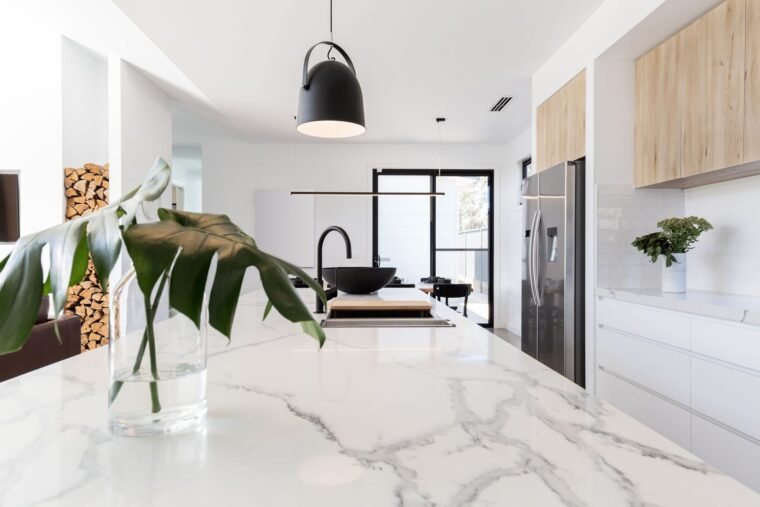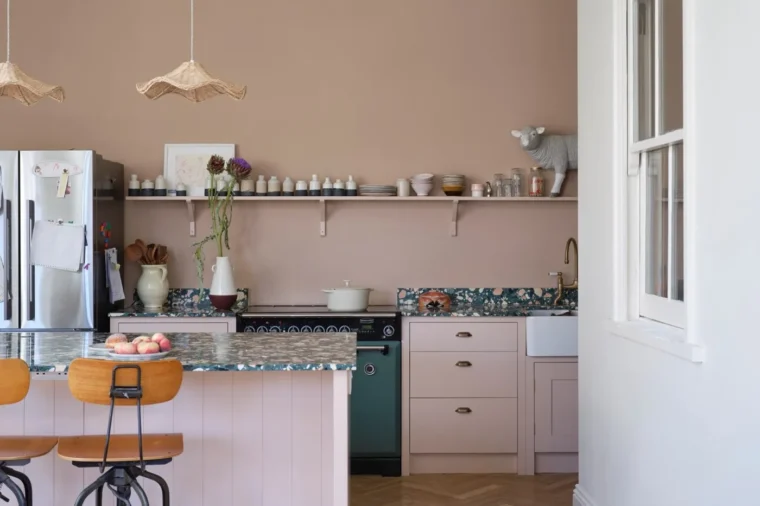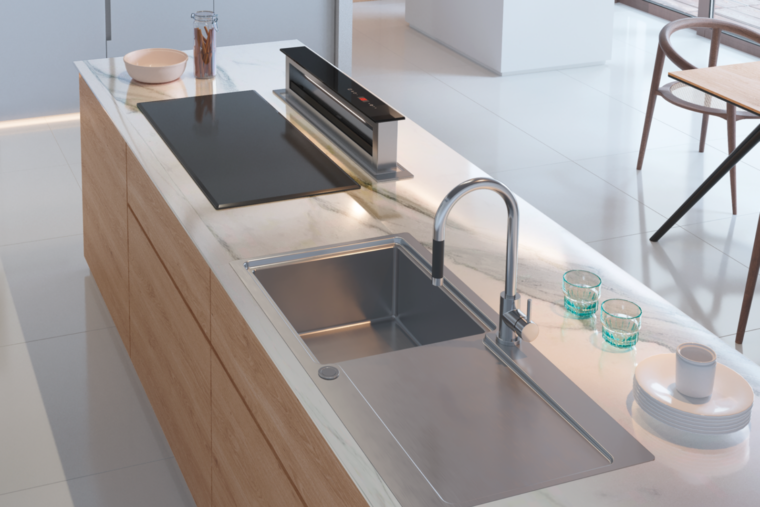Renovating your kitchen not only revitalizes the heart of your home but also presents a prime opportunity to adopt a more sustainable lifestyle. As environmental awareness grows, so does the interest in eco-friendly materials that promise durability, aesthetic appeal, and minimal ecological impact.
For those considering a kitchen renovation, choosing the right countertop material is crucial to both the aesthetics and functionality of the space. Understanding the differences in materials such as quartz, granite, and marble, including aspects like durability, maintenance, and visual appeal, can help you make an informed decision that aligns with your sustainable living goals.
This article explores the realm of sustainable materials perfect for your next kitchen renovation, ensuring that your culinary space is not just stylish but also kind to the planet.
Eco-Friendly Flooring Options
Flooring is another critical consideration in kitchen renovations. Sustainable materials such as cork, bamboo, and linoleum (made from natural linseed oil, pine rosin, and jute) stand out for their eco-credentials.
Cork, for instance, is harvested from the bark of cork oak trees without damaging the tree itself, offering a renewable and biodegradable flooring option. These materials not only reflect a commitment to the environment but also deliver in terms of durability and ease of maintenance.
The Rise of Eco-Friendly Materials

The demand for sustainable building materials has surged as homeowners become increasingly conscious of their environmental footprint. These materials are characterized by their low impact on the earth, energy-efficient production processes, and ability to be recycled or biodegraded at the end of their lifecycle.
Embracing these materials in kitchen renovations is a step toward sustainable living, offering a blend of functionality and ethical responsibility.
Sustainable Cabinetry Choices
Wood may be the traditional go-to for kitchen cabinets, but the choice of wood can significantly impact your kitchen’s environmental footprint. Opting for cabinets made from sustainably sourced or reclaimed wood can dramatically reduce this impact.
Such wood is either certified by organizations like the Forest Stewardship Council (FSC), ensuring that it comes from responsibly managed forests, or reclaimed from old structures, thereby repurposing existing materials without further depleting resources.
Countertops That Care

Countertops are the centerpiece of any kitchen. Options like recycled glass, bamboo, and reclaimed wood not only offer unique aesthetics but also tell a story of sustainability. Recycled glass countertops, for instance, are made from broken glass pieces bound with a resin base, offering a colorful and durable surface.
Bamboo, a rapidly renewable resource, provides a warm, wood-like appearance without the environmental toll of deforestation. Conversely, reclaimed wood adds character and history, repurposing timber from old buildings or furniture into stunning, eco-friendly countertops.
Energy-Efficient Fixtures and Fittings
Efficiency goes beyond just the materials. Incorporating energy-efficient fixtures and fittings can significantly cut down on your kitchen’s energy consumption. LED lighting, eco-friendly faucets, and water-saving appliances not only reduce your utility bills but also your kitchen’s carbon footprint.
These fixtures are designed to provide maximum functionality while minimizing energy and water wastage, embodying the principle of sustainable living.
Paints and Finishes ─ The Finishing Touch

The choice of paints and finishes can greatly influence the environmental impact of your kitchen renovation. Traditional paints often contain VOCs (Volatile Organic Compounds) that can harm indoor air quality.
Opting for low-VOC or no-VOC paints and finishes protects your health and contributes to a cleaner, safer environment. These products are now available in a wide range of colors and finishes, allowing for beautiful design without compromise.
Recycling and Upcycling ─ A Creative Twist
Integrating recycled or upcycled elements into your kitchen design not only adds character but also embodies the essence of eco-friendliness. Old furniture can be transformed into kitchen islands or cabinets, while antique fixtures can be repurposed as statement lighting. This approach not only reduces waste but also grants your kitchen a unique look that tells a story of sustainability and creativity.
Modern Sustainable Technologies

Advancements in technology are now paving the way for more sustainable kitchen designs. From smart appliances that optimize energy and water use to advanced materials engineered for longevity and recyclability, technology plays a key role in eco-friendly renovations.
Homeowners can now choose from a range of high-tech options that reduce environmental impact while offering modern convenience and style.
The Global Impact of Sustainable Living
Eco-friendly kitchen renovations are part of a larger movement towards sustainability that spans across the globe. By choosing sustainable materials and practices, homeowners contribute to a collective effort to preserve natural resources, reduce carbon emissions, and support responsible manufacturing processes.
This global perspective reinforces the importance of sustainable living choices in creating a healthier planet for future generations.
Green Certification and Standards

Understanding the certifications and standards behind sustainable products can help homeowners make informed decisions. Look for labels like the FSC for wood products, ENERGY STAR ratings for appliances, and the GreenGuard certification for low-emission materials.
These certifications are a testament to a product’s environmental stewardship, indicating that it meets rigorous sustainability criteria.
Conclusion
Choosing sustainable materials for your kitchen renovation is a profound way to align your living space with your environmental values. From countertops to cabinetry and beyond, there are myriad options to create a kitchen that is both functional and eco-friendly.
As we move towards a more sustainable future, considering these materials and practices in our home renovations can make a significant contribution to the health of our planet. Let your kitchen not just be a place of culinary delight but also a testament to conscious living and environmental stewardship.
